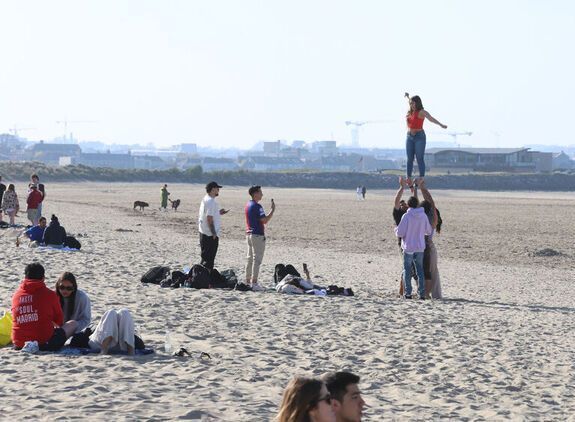By Frieda Klotz
[caption id="attachment_41816" align="aligncenter" width="300" caption="The sign outside the Kerry Hall in Yonkers."]
With its clean wood floors and light green painted walls, Kerry Hall in McLean Avenue in Yonkers is a testament to the hard work of those who paid for and refurbished it.
It is also now the site of a growing debate within the New York Kerrymen's Patriotic and Benevolent Association on the question of whether or not to admit women.
As the association's title suggests, it is made up of men from Kerry and men who are the sons and descendants of Kerry immigrants. Although women participate in events at Kerry Hall, they cannot formally become members.
Last October that looked set to change when a vote took place showing that a 60 percent majority of members were in favor of admitting women.
However, because a two-thirds majority is needed to alter the association's constitution, the status quo remains intact.
The issue is threatening to create divisions in the community. At a recent event in Yonkers, women staged a walkout, attending a Mass but declining to remain for the meal that followed.
One woman, who did not wish to be named, said, "It was a beautiful Mass, but we didn't stay for the breakfast. We felt we weren't wanted, so we left."
The feeling is widespread amongst women who have connections with Kerry.
"I really do, honest to God, think in this day and age that it's terrible," said Sally O'Shea, whose husband is a member. Originally from Knocknagoshel in County Kerry, O'Shea moved to New York forty years ago and lives in Yonkers. She said that women give a lot to the
organization.
"Whenever there's big events, we all help out, doing what we have to do, to make it a success."
Founded in 1881, the Kerrymen's Association is one of the oldest county organizations in New York. It was set up at a time when Irish immigrants struggled to get jobs and frequently encountered prejudice.
If one man found employment he would work hard to impress his boss and then recommend other Kerrymen for similar positions. By
banding together, members forged a network that gave them influence and strength.
In that era, many county organizations were men only (often with separate ladies' sections), but in more recent times most other county organizations have gradually let women in.
The Kerrymen's Association is now the only county group in New York to continue a policy of single sex membership.
"I do know they don't allow ladies. They're one of the last hangouts at this moment," said Joseph McManus, president of the United Irish Counties.
"It's not for us to tell them what to do. That's their decision and we don't have a part to play," McManus said diplomatically.
It is unclear precisely why some men do not want women to join. A request put to the men who voted against women's admission to be interviewed for this article met with no response.
But a desire to uphold tradition is one likely reason. For a long time membership requirements were even stricter than they are now, and only men who were specifically the sons of men from Kerry were allowed to join.
A constitution handbook dating from 1940 states: "Persons entitled to membership of this Association shall be Kerrymen or the descendants of Kerrymen on the male line of good character and in good health."
Critics say that the all-male rule is outdated and cite practical considerations as well as higher ideals of sexual equality. For example, they say that the children of Kerrywomen are unable to apply for a scholarship that the association offers its members' children, this to help fund high school and college studies.
Tom Kennedy, president of the association, was unable to comment for this article but Maurice Brick, the public relations officer, said the association valued the role that women play.
"Every single event we have there are women present, there is no doubt about that," he said.
"Of course there are women involved," he added while pointing out that the October vote was a democratic one. He further indicated that the issue would be sorted out internally.
In the meantime, the women are working on it too. They presented a petition stating their case to an Officers meeting on Thursday December last month.
"This is the first time they have been confronted by us ladies. We're not stopping here," said Sally O'Shea.
About 120 women signed the letter, she added. All are linked to Kerry through their parents, grandparents, or because they were born there.









